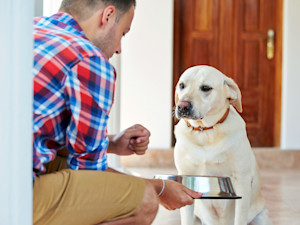10 Reasons Why Your Dog Throws Up in the Morning
Some are more concerning than others.

Share Article
In This Article:
Is it Normal for Dogs to Throw Up in the Morning? 10 Common Reasons Why Dogs Throw Up In the Morning Only What to Do If Your Dog Is Throwing Up In the Morning Treatment Options For Dogs Who Chronically Throw Up How to Prevent Your Dog From Throwing Up Every Morning Frequently Asked Questions
Occasionally cleaning up vomit is a part of being a dog parent. Vomiting isn’t an uncommon occurrence for dogs, but if that coughing, retching sound somewhere in your home is starting to become your morning wake up, it’s time to do something about it. There are many reasons why a dog would vomit frequently, even every morning, and, fortunately, there are some things you can do about it.
Is it normal for dogs to throw up in the morning?
Vomiting is never really considered normal. It’s not something that the body does just for kicks. Instead, vomiting is an indication that something is going on with a dog’s digestive system or with the connection to the brain. A veterinarian should check out repeated or regular vomiting.

When should you be concerned if your dog throws up each morning?
One vomiting episode here or there usually isn’t something to become concerned about. But, if your dog is making vomiting part of their morning ritual, it’s time to do something. If your dog vomits more than once in 24 hours or on a regular basis, get your veterinarian involved.
10 common reasons why dogs throw up in the morning
1. Empty stomach (aka, hunger pukes)
Dogs love to stick to a schedule, especially one where they know when they’re going to eat next. Unfortunately, for some dogs, that schedule that we set doesn’t work for their stomach. When they go long hours in between feedings, such as overnight, they may vomit. This is called bilious vomiting syndromeopens in new tab; the stomach produces acid in preparation for the next meal. If that next meal doesn’t come quickly, the acid can irritate the stomach, causing vomiting.
Dogs will often vomit bile, a yellowish, foamy liquid in the morning. Dogs who are only fed once per day or have early dinners are typically more affected.
2. Eating food too quickly
Eating food too fast, especially on an empty stomach, can lead to vomiting because it doesn’t give the stomach enough time to accommodate that food. Dogs who eat quickly may also swallow a lot of air, which the stomach also tends not to like and, therefore, may trigger vomiting.
3. Parasites
Parasites that live in the digestive tract can lead to vomiting due to irritation of the digestive linings, though they more commonly show up with diarrhea. Along with vomiting and diarrhea, dogs may also have weight loss, lethargy, and a poor hair coat.
4. Eating grass
You’ve no doubt seen your dog grazing on the grass in your yard. No, they’re not harnessing their inner cow; they’re just doing what comes natural. Dogs may eat grass for a number of reasonsopens in new tab, but the end result is often the same—vomiting. So, if your dog is regularly eating grass and then vomiting, you should have your veterinarian look into it.
5. Exercising too much after eating
You know that the last thing you want to do after a meal is go for a run. Well, your dog’s body feels the same. Heavy exercise on a full stomach can lead to discomfort, for which the body’s best solution is vomiting.
6. Anxiety or stress
Some dogs are pretty chill; others can literally vibrate with stress or anxiety. Besides restlessness, stress and anxiety can also cause vomiting. Maybe your neighborhood is extra noisy in the morning, or your dog gets anxious when you’re getting ready for work – either way, it can make a dog vomit.
7. Dietary issues
Dogs can develop allergies or sensitivities to ingredients in their diet. While these often show up as skin issues, they can also create signs of vomiting and diarrhea. Dogs can be allergic or sensitive to protein sources, such as chicken, beef, or egg, to grain sources, such as wheat or barley, or to any dairy products in their diet. Some dogs are very sensitive to diet changes, and may vomit if they eat a new type of food.
8. Foreign body
Dogs are known for their indiscretion when it comes to eating and if given the chance, they may consume non-food items. If these items aren’t digestible, they can lodge in the digestive tract, creating irritation or even intestinal blockages. Both issues can cause vomiting along with weight loss, abdominal pain, and diarrhea or constipation.
9. Infectious diseases
Bacterial or viral infections of the digestive system can cause vomiting along with diarrhea, inappetence, lethargy, and fevers. Dogs who aren’t up-to-date on vaccinations and those who frequent areas with other dogs are most at risk. Dogs can also get bacterial infections from eating contaminated food, like Salmonella. Some spoiled foods may also contain toxins, which can also make your dog sick.
10. Medical conditions
Other medical conditions, such as inflammatory bowel disease, pancreatitis, and uncontrolled diabetes, can cause frequent vomiting. Be on the lookout for other signs, such as diarrhea, not eating, increased drinking, and abdominal pain.
If your female dog is intact, pregnancy may be the issue, so have your vet check them out.
Some medications may also lead to vomiting, so if your dog just started a course of something new and is now vomiting regularly, tell your veterinarian.
What to do if your dog is throwing up in the morning
If you’re able to keep your schedule based on your dog’s vomiting rather than a clock, it’s time to do something. You can start by getting a feel for when it happens. Is it before or after eating? After exercise? When did the problem start? Have there been recent changes to your dog’s diet or lifestyle? Are there any other signs, such as diarrhea, lethargy, or weight loss?
Take note of this information and then see your veterinarian. They will start off with a thorough examination, looking for any other abnormalities, such as pain and dehydration. Bloodwork and a fecal test may be necessary to rule out parasites and other health issues, and imaging may help diagnose a foreign object.
Treatment options for dogs who chronically throw up
Hopefully, your vet will be able to pinpoint the cause of your dog’s vomiting woes. From there, putting a stop to it will depend on the cause. Any underlying illnesses will need to be treated, which may mean a diet change, medications, or supportive therapy. Foreign objects may need surgical removal, and you may need to alter your feeding and exercise schedule.
How to prevent your dog from throwing up every morning
Altering your feeding schedule is a good place to start. Dogs who vomit in the morning may do better if fed a small meal at bedtime to help reduce bilious vomiting syndrome, and a slow feeder may come in handy to damper down those gulper eaters. Give your dog at least 30 minutes post-eating before exercise and keep them up to date on vaccinations and anti-parasiticides.
Supervision and training are key for preventing foreign object ingestion. Training, you ask? Teaching your dog to “leave it” or “drop it” can help keep them from eating things they shouldn’t.
For dogs who are stressed or anxious, sticking to a normal schedule and providing lots of exercise and mental stimulation can help.
FAQs
Does a feeding schedule affect a dog’s morning sickness?
Going for long hours between meals can cause a dog to vomit simply because the stomach continues to produce bile in preparation for the next meal. Bile can be very irritating if there isn’t any food in the stomach, and a dog may vomit to try to rid the irritation. Feeding a small meal right before bed can help keep food in the stomach during the night so there is less irritation from bile.
Why is my dog throwing up yellow foam in the morning?
Vomit that looks like yellow foam is usually bile. Throwing up bile in the morning can happen when a dog goes too long between meals or if they have a stomach condition where they’re not eating.
Why is my dog throwing up every day but acting normal?
Vomiting doesn’t always mean that a dog feels bad. Chronic vomiting can happen when a dog goes too long in between meals, when they eat too quickly, or if they exercise on a full stomach. However, it can also be the result of something more serious, though these causes usually come with other signs.
What is empty stomach syndrome in dogs?
Empty stomach syndrome is also known as bilious vomiting syndrome. When a dog goes for a long time between meals, such as overnight, their stomach continues to accumulate bile in preparation to digest the next meal. If there’s no food in the stomach, the bile can cause irritation, which can lead to vomiting. It’s often best treated by feeding a meal at bedtime so that a dog has food in their stomach overnight.
References
Johnson, Tony DVM. “Bilious Vomiting Syndrome in Dogs and Cats. Veterinary Partner. 24 Sep 2024. https://veterinarypartner.vin.com/default.aspx?pid=19239&id=12296225opens in new tab.
Verlinden A, Hesta M, Millet S, et al. Food allergy in dogs and cats: a review. Crit Rev Food Sci Nutr 2006;46(3):259–73.
Weir, Malcolm DVM, MSc, MPH and Lynn Buzhardt, DVM. “Why Dogs Eat Grass.” VCA Animal Hospitals. https://vcahospitals.com/know-your-pet/why-do-dogs-eat-grassopens in new tab.

Dr. Chyrle Bonk, DVM
Dr. Chyrle Bonk has been a mixed-animal veterinarian since 2010, with a special interest in rehabilitation. When she's not practicing or writing about veterinary medicine, you may find her exploring the outdoors with her family or tending to her cows, horses, chickens, or cats and dogs.
Related articles
![dog cuddling their pet parent on the couch]()
Why Does My Dog Throw Up Yellow Bile?
It’s not a pretty sight, but it’s important to know what’s going on.
![Kurzhaar's dog eats grass, oats, happy puppy playing in the meadow]()
Why Do Dogs Eat Grass?
Your pup is literally vegging out—when it’s no big deal and when to worry.
Can Dogs Get a Stomach Bug?
No one likes it when their tummy hurts.
![Man trying to tempt dog to eat his kibble.]()
How Long Can Dogs Go Without Eating?
If you ask them, they would say they should be eating always. But here’s the truth.
![black and white dog looking ill laying on couch]()
Warning Signs Your Dog Needs to Go to the ER — Stat
Trust me, I’m a vet.
Why Does Your Dog Keep Gagging But Not Throwing Up?
What’s goin’ on there, pal?






